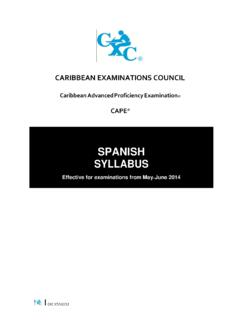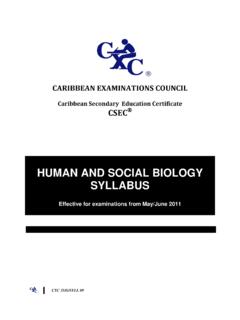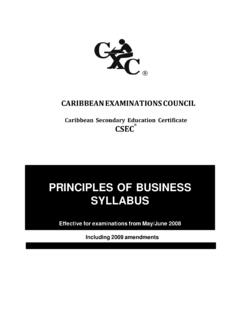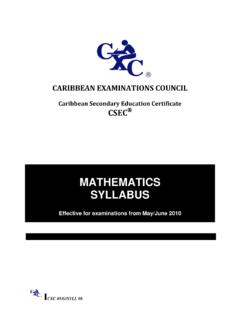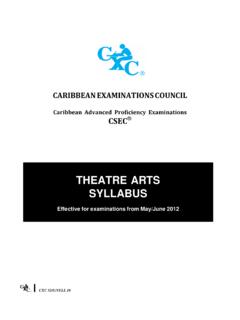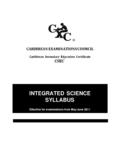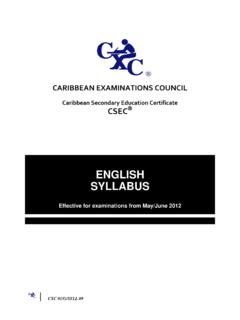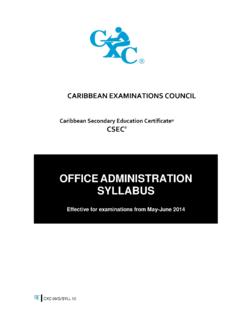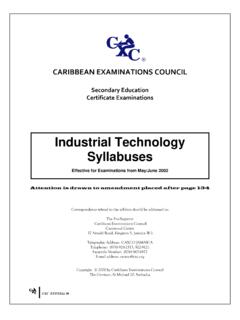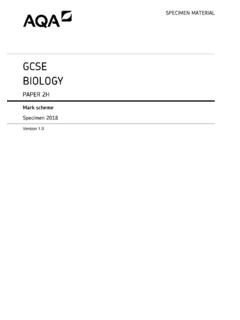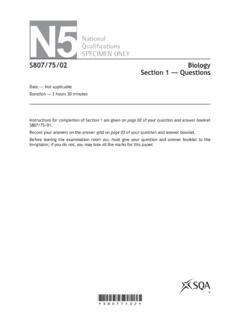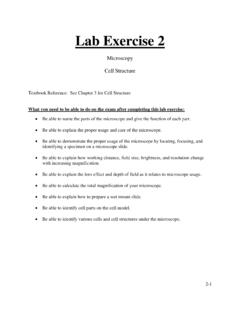Transcription of CSEC Biology Syllabus - Caribbean Examinations Council
1 CXC 20/G/SYLL 13 Caribbean EXAM INATIONS Council Ca r ib b e a n Se co n d a r y Ed u ca t io n Ce r t if ica t e CSEC a) NCH Biology Syllabus Effective for Examinations from May June 2015 CXC 20/G/SYLL 13 Published by the Caribbean Examinations Council All rights reserved. No part of this publication may be reproduced, stored in a retrieval system, or transmitted in any form, or by any means electronic, photocopying, recording or otherwise without prior permission of the author or publisher.
2 Correspondence related to the Syllabus should be addressed to: The Pro-Registrar Caribbean Examinations Council Caenwood Centre 37 Arnold Road, Kingston 5, Jamaica Telephone Number: + 1 (876) 630-5200 Facsimile Number: + 1 (876) 967-4972 E-mail Address: Website: Copyright 2013 by Caribbean Examinations Council The Garrison, St Michael BB14038, Barbados CXC 20/G/SYLL 13 Content RATIONALE .. 1 AIMS .. 2 CANDIDATE POPULATION .. 2 SUGGESTED TIME-TABLE ALLOCATION .. 3 ORGANISATION OF THE Syllabus .
3 3 SUGGESTIONS FOR TEACHING THE Syllabus .. 3 CERTIFICATION AND DEFINITION OF PROFILES .. 4 FORMAT OF THE Examinations .. 6 REGULATIONS FOR PRIVATE CANDIDATES .. 7 REGULATIONS FOR RESIT CANDIDATES .. 7 THE PRACTICAL APPROACH .. 7 SECTION A - LIVING ORGANISMS IN THE ENVIRONMENT .. 12 SECTION B - LIFE PROCESSES AND DISEASE .. 19 SECTION C - CONTINUITY AND VARIATION .. 37 APPENDIX I - GUIDELINES FOR SCHOOL-BASED ASSESSMENT .. 45 APPENDIX II - RECOMMENDED MINIMUM EQUIPMENT LIST.
4 73 APPENDIX III - RECOMMENDED MATERIAL LIST .. 74 APPENDIX IV - RESOURCE MATERIALS .. 75 APPENDIX V - GLOSSARY .. 76 CXC 20/G/SYLL 13 This document CXC 20/G/SYLL 13 replaces CXC 20/G/SYLL/02 issued in 2002. Please note that the Syllabus has been revised and amendments are indicated by italics. First published 1983 Reprinted with amendments 1986, 1987 Revised 1991, 1996, 2002, 2013 Please check the website for updates on CXC s syllabuses. CXC 20/G/SYLL 13 1 Biology Syllabus RATIONALE The application of scientific principles and the conduct of relevant research are of significant importance in identifying, assessing and realising the potential of the resources of Caribbean territories.
5 A good foundation in the sciences will enhance the ability of our citizens to respond to the challenges of a rapidly changing world using the scientific approach. Biology is the discipline in science which seeks to understand the organisation of the organic world through an exploration of the structure and function of life forms at the molecular, cellular, organismal and ecosystem levels, as well as the complex interactions and interdependencies which occur at each of these levels.
6 This knowledge provides the foundation for understanding the opportunities for promoting the well-being of humans and other living organisms in the environment. It generates an awareness of the importance of our biodiversity and the unique role of humans in conserving, protecting and improving the quality of the biological environment for future generations. The CSEC Biology Syllabus is redesigned with a greater emphasis on the application of scientific concepts and principles.
7 It recognises the need for an understanding of some of the basic principles of Chemistry, Physics and Mathematics, and, therefore seeks to strengthen the inter-relationship with these subjects. It also recognises the inter-relatedness among the topics in Biology , and social and environmental issues. Such an approach is adopted to develop those long-term transferable skills of ethical conduct, team work, problem-solving, critical thinking, and innovation and communication.
8 It encourages the use of various teaching and learning strategies to inculcate these skills that will prove useful in everyday life, while at the same time catering to multiple intelligences and different learning styles and needs. It will provide a sound foundation to pursue the study of Life Sciences and related professions at the post-secondary level. This Syllabus will contribute to the development of the Ideal Caribbean Person as articulated by the CARICOM Heads of Government in the following areas: respect for human life and awareness of the importance of living in harmony with the environment; demonstrates multiple literacies; independent and critical thinking and the innovative application of science and technology to problem solving.
9 In keeping with the UNESCO Pillars of Learning, this course of study will also contribute to a person who will learn how to do, learn to live together and learn to transform themselves and society. CXC 20/G/SYLL 13 2 AIMS The Syllabus aims to: 1. develop an understanding of fundamental biological principles and concepts (such as structure and function relationships; unity in diversity; energy transduction), based upon practical and theoretical knowledge of living organisms and the environment; 2.
10 Make accurate observations of biological material and phenomena, both in the field and in the laboratory; 3. develop the ability to record information accurately; 4. formulate hypotheses and plan, design and carry out experiments to test them; 5. develop the ability to appraise information critically, identify patterns, cause and effect, stability and change and evaluate ideas; 6. appreciate that although generalisations have predictive value, there are often exceptions to them; 7. develop problem-solving and critical thinking skills; 8.
